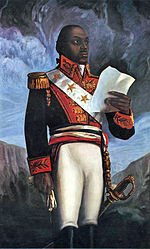Toussaint Louverture, Date of Birth, Place of Birth, Date of Death
TweetToussaint Louverture
Leader of the Haitian Revolution
 Date of Birth: 20-May-1743
Date of Birth: 20-May-1743
 Place of Birth: Cap-Haïtien, Nord, Haiti
Place of Birth: Cap-Haïtien, Nord, Haiti
Date of Death: 07-Apr-1803
Profession: military personnel, politician
Nationality: France, Haiti
Zodiac Sign: Taurus 
About Toussaint Louverture
- François-Dominique Toussaint Louverture (French: [f??~swa d?minik tus?~ luv??ty?] 20 May 1743 – 7 April 1803), also known as Toussaint L'Ouverture or Toussaint Bréda, was a Haitian general and best-known leader of the Haitian Revolution.
- He was a leader of the growing resistance.
- His military and political acumen saved the gains of the first black insurrection in November 1791.
- He first fought for the Spanish against the French; then for France against Spain and Great Britain; and finally, he fought on behalf of Saint-Domingue in the era of Napoleonic France.
- He helped transform the slave insurgency into a revolutionary movement.
- Although Louverture did not sever ties with France in 1800, he created a de facto autonomous colony.
- The colony's constitution proclaimed him governor for life even against Napoleon Bonaparte's wishes.
- He died betrayed before the final and most violent stage of the armed conflict.
- However, his achievements set the grounds for the black army's absolute victory and for Jean-Jacques Dessalines to declare the sovereign state of Haiti in January 1804.
- Louverture's prominent role in the Haitian success over colonialism and slavery had earned him the admiration of friends and detractors alike.Toussaint Louverture began his military career as a leader of the 1791 slave rebellion in Saint-Domingue; he was by then a free man and a Jacobin.
- Initially allied with the Spaniards of neighboring Santo Domingo (modern Dominican Republic), Louverture switched allegiance to the French when the new government abolished slavery.
- He gradually established control over the whole island and used political and military tactics to gain dominance over his rivals.
- Throughout his years in power, he worked to improve the economy and security of Saint-Domingue.
- Worried about the economy, which had stalled, he restored the plantation system using paid labour, negotiated trade treaties with the United Kingdom and the United States, and maintained a large and well-disciplined army.After defeating leaders among the free people of color, in 1801, he promulgated an autonomist constitution for the colony, which named him as Governor-General for Life.
- In 1802 he was betrayed by General Jean-Jacques Dessalines, his second in command, and arrested in a diplomatic meeting with Napoleon Bonaparte's top general in Saint-Domingue in an attempt to restore French authority in the former colony.
- He was deported to France and jailed, dying of pneumonia in 1803.
- Suffering massive losses in multiple historic battles at the hands of the Haitian army and losing many men of their forces to yellow fever, the French capitulated and withdrew permanently from Saint-Domingue that very year.
- The Haitian Revolution continued under Louverture's lieutenant, Jean-Jacques Dessalines, who declared independence on 1 January 1804.
Read more at Wikipedia
See Also
- Famous People's Birthdays on 20 May, Haiti
- Famous People's Birthdays in May, Haiti
- Famous People's Birthdays on 20 May, France
- Famous People's Birthdays in May, France
- Famous military personnel's Birthdays on 20 May, Haiti
- Famous military personnel's Birthdays in May, Haiti
- Famous politician's Birthdays on 20 May, Haiti
- Famous politician's Birthdays in May, Haiti
- Famous military personnel's Birthdays on 20 May, France
- Famous military personnel's Birthdays in May, France
- Famous politician's Birthdays on 20 May, France
- Famous politician's Birthdays in May, France

